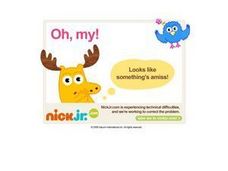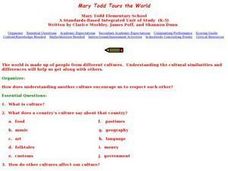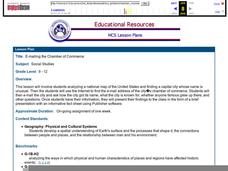Curated OER
Lessons from the Holocaust
Learners discover what a dictatorship is by examining the holocaust. In this government lesson plan, students discuss the laws that were enacted for Nazis to take control of Germany, and the types of laws we have put place to prevent...
Curated OER
High Profiles
Students research and write newspaper articles about current world leaders, using a New York Times International article as a model. They research a current world leader's personal background and political history.
Curated OER
Symbols of the World, Country and State
First graders understand what a symbol is and recognize symbols of the world, country, state, and local areas. In this symbols instructional activity, 1st graders identify symbols, and play a bingo game with traffic symbols. Students...
Curated OER
A System of Rules
Students write letters, create models, create a photo display, and make charts about the rules that a state has. In this rules lesson plan, students learn about and make different displays of how states come up with rules, change them,...
Curated OER
Immigration and Identity
Young scholars will analyze four historical events: The Annexation of U.S. Southwest, The Mexican Revolution, The Great Depression, and World War II. They determine how each event affected immigration to the U.S. from Mexico and Central...
Curated OER
Lesson 3: U.S. Neutrality and the War in Europe, 1939-1940
Learners examine the U.S. neutrality policies that preceded American involvement in World War II. In this World War II lesson, students explore the events in Europe from 1939 to 1940 and Roosevelt's decision to give military aid to Britain.
Curated OER
Politics and Leadership
Young scholars research a historic leader and analyze how a philosopher's writings influenced the ruler in an essay. In this philosophy of government lesson plan, students view a video and participate in a class discussion on how great...
Curated OER
Algebra Applies to the Real World? No Way!
Sixth graders examine the connections between math and real life. In this algebra lesson, 6th graders use Algepairs Cards to complete the problems presented and discuss how algebra relates the real world.
University of the Desert
Why Is Cultural Diversity a Positive Thing?
From more empathetic individuals to greater tolerance in government, learners explore the benefits of a culturally diverse world through a series of collaborative, discussion-based activities.
Curated OER
End of WWI: The Treaty of Versailles
After learning about the causes and closure of WWI, hand out this resource on that outlines the differences between Wilson's 14 Point Plan and the Treaty of Versailles. The class reads the information provided then analyzes two political...
US Institute of Peace
Organizations Working for Peace
From helping refugees to negotiating peace treaties, the peacekeepers of the world keep busy! Introduce young activists to the many individuals and organizations throughout the world that work daily toward peace. 14th in a series of 15...
Population Connection
Where Do We Grow from Here?
Did you know that the population is expected to grow to 11 billion by 2100? The resource serves final installment in a six-part series on the global population and its effects. Scholars interpret data from the United Nations about the...
University of the Desert
What Is Extremism?
By participating in discussions using prompts and statements provided in the lesson plan, learners identify the concept of extremism and consider what causes violent acts of extremism in the modern world.
US Institute of Peace
Defining Conflict
Before there can be peace, we have to understand conflict. Introduce the concept of conflict through a two-part activity that combines discussion, collaboration, and writing. The first in a 15-part series examines the multiple meanings...
Curated OER
Islamic Faith and Discrimination
After the events on 9/11 many Muslim-Americans experienced discrimination because of their ethnicity and faith. Help break the cycle of ignorance by educating your students on the history, religion, and beliefs of a different culture....
US Institute of Peace
Simulation on The Israeli-Palestinian Conflict
How do you solve a conflict that's been around for so many years? Scholars discover the viewpoints of stakeholders in the Israeli-Palestinian conflict during an emotionally charged simulation. A facilitator moderates discussions between...
Curated OER
Making Sense Of A Round World On A Flat Surface
Students engage in a lesson that is concerned with the development of geography skills. They take part in a number of activities that center around finding and traveling to different locations. The lesson has resource links that can be...
Curated OER
Mary Todd Tours the World
Pupils analyze how distinguishing another culture encourages us to respect each other. They research culture and all its avenues, recognizing and comprehending the relationship between people and geography. Ultimately, they can apply...
Curated OER
Sow the Seeds of Victory! Posters from the Food Administration During World War I
Students engage in a class analysis of posters, responding to each of the worksheet questions. They identify the similarities and differences between the posters.
Museum of Tolerance
Documents That Shape Society
The Bill of Rights is a foundational document of American democracy, much like the Nuremberg Laws were a foundational document of the Reichstag of Nazi Germany. But that's where their similarities end. Engage high schoolers in a...
University of California
Principles vs. Practices
Have you ever wondered what your own World Order would look like? Scholars use primary and secondary documents as well as video clips to investigate and analyze the Cold War. Using the sources, the principles and practices of nations...
Curated OER
E-mailing the Chamber of Commerce
Encourage effective internet research and e-mail correspondence as scholars investigate a US capital city they've never visited to find pertinent and relevant information. They begin by picking a city, then visit that city's chamber of...
National Endowment for the Humanities
Victory and the New Order in Europe
A New Order in Europe calls for a new lesson plan! This third plan in a series of four sequential lessons encourages high schoolers to read primary sources about the development of the New Order and follow up their knowledge with a...
US Holocaust Museum
Defying Genocide
Defying death. Defying those who want to do harm. Defying genocide. Pupils research the events in Rwanda to gain an understanding of what it takes to survive a horrific event like a holocaust. They use video, time lines, and Holocaust...

























